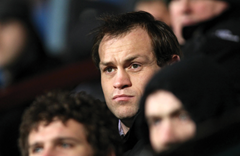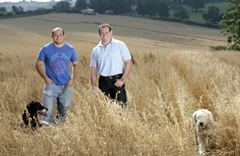Simon Best interview
 Former Ulster and Ireland captain Simon Best hopes that Ireland can add to its Grand Slam success at this year’s Rugby World Cup. He talks to Peter Cheney about life after retirement.
Former Ulster and Ireland captain Simon Best hopes that Ireland can add to its Grand Slam success at this year’s Rugby World Cup. He talks to Peter Cheney about life after retirement.
“There’s no reason why Ireland can’t push on through this period and maintain a spot in the top four in the world.”
That’s Simon Best’s assessment of Irish chances on the verge of the Rugby World Cup, which kicks off in New Zealand on 9 September. A health scare during the last World Cup campaign led to Best’s retirement and, on a new path in life, he went back to work on the family farm outside Poyntzpass.
He was taken ill in Bordeaux in September 2007, first feeling pins and needles in his hand and arm, before the symptoms of a stroke developed. However, they disappeared again within 12 hours.
“I was quite fortunate, I suppose. I was in the hotbed of cardiac medicine globally,” he quips. “If you want to be anywhere with a heart complaint, Bordeaux is the place.”
Ireland’s 15-30 loss to Argentina was a disappointing watch from his hospital bed, as well as a frank diagnosis from a French doctor saying he couldn’t play again. That news was “the biggest shock” as he had thought it was “just a migraine.”
The final conclusion was that it was a transient ischaemic attack, where the stroke-like symptoms recede within 12 hours.
Prior to that, he had been at the height of his focus, training every day. While he recovered, he detrained and took time to consider what the future could hold.
“Despite the initial shock, I remained optimistic that I could play again,” he recalled but as the weeks went on, he sat back and got his head around the situation. His decision to retire was “medical first and foremost” but also based on other aspects of his life, including recently being married.
Best had joined Ulster in 1999, gaining 118 caps, and won 23 caps for Ireland following his international debut in 2003. He captained Ireland in its 2007 summer tour of Argentina.
Throughout the interview, he stresses the “first class” support from Ulster and Ireland. Team doctor Gary O’Driscoll spent the whole night with him in hospital, “just keeping tabs on the doctors, making sure that I was comfortable and safe.”
O’Driscoll “really went outside of his call” given that 29 other players needed medical attention too. Best was then treated by Dr David Keane, considered the top cardiologist in Ireland, at Dublin’s Blackrock Clinic.
Ulster helped him out with his gym programme and stood by him financially. As the weeks went on, though, it became more likely that he would not play again.
His brother Rory’s success gave him “an excuse to go to games”. Rory took over as Ulster captain and has gone from strength to strength, also captaining Ireland.
Transition
Life didn’t change quickly. In the limbo time, he had to prepare himself for either retirement or going back to the game. He comments: “I think that was a much easier way to cope with retirement than having a serious knee injury, which meant that you couldn’t play the next day and you simply knew you were finished.”
Working on the farm opened up as an alternative. Best had studied agriculture at Newcastle but had not needed to use that experience immediately, as his father was still fairly young. Rugby broadened his horizons and also developed his leadership skills, now useful for business.
 The farm mainly grows cereals and also has an Aberdeen Angus and suckler beef herd. To “bring as many strings to the farming bow,” the family has set up a renewable energy business on-site (biomass from wood and waste) and owns property around Newry.
The farm mainly grows cereals and also has an Aberdeen Angus and suckler beef herd. To “bring as many strings to the farming bow,” the family has set up a renewable energy business on-site (biomass from wood and waste) and owns property around Newry.
Best also gives back to rugby by coaching at Banbridge and representing the club on Ulster committees.
“Pure luck” took him into the professional game as a student. Starting Newcastle in 1996, he played for both the university and the newly professional Newcastle Falcons. Sir John Hall had just taken over the club, bringing in Rob Andrew and Inga Tuigamala to develop it.
“As an 18-year old kid from Poyntzpass, you didn’t even dream that you could play rugby as a professional, let alone play for Ireland.”
With his Irish schools experience, he “landed into Newcastle with a bit of credibility”. Newcastle had 18 headline players but the rest of the squad were students. The team won the league in his second year and after graduating, he was offered a fully professional contract by both Ulster and Newcastle. Best chose the Ulster route.
As players get younger, it’s vital that they think long-term. He cautions clubs to “make sure that [players] do have a third level education and are set for a career after rugby.” His 10-year career would now be the exception, although this is “as much down to the fact that there are so many quality players coming in behind.” The sport’s physical impact also has a bearing.
Performance
Ulster went through a “very difficult” period after his retirement, losing players such as David Humphreys and Neil Best.
However, it has now crossed a watershed and is making “massive strides”. Brian McLoughlin’s team “understand the game locally.”
“To make the quarter-final of the European Cup for the first time in 12 years speaks volumes,” he states, adding that it “can only be a stepping stone” given the team’s appetite for the cup. He’s also pleased to see the “genuine potential” coming up through the academy system, run by Gary Longwell.
“Hopefully they’ll now see that those difficult times have actually borne some fruit and they’ll reap the rewards,” Best says.
Difficult times also beset Ireland. The quality of the players, in his view, did not change but they regained their confidence over time. Younger players like Rob Kearney and Jamie Heaslip came in almost without being noticed.
The World Cup is clearly in their sights. “There’s a lot of hunger in the squad to actually put right what went wrong four years ago but not only that, prove what a good team Ireland are and the good systems they have in place.”
As Brian O’Driscoll, Paul O’Connell and Ronan O’Gara reach the peak of their career, he hopes that they will “go out with something special” to match the Grand Slam and Triple Crown victories.





